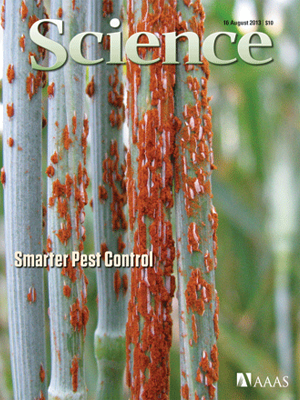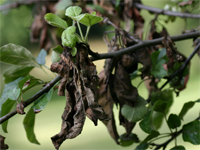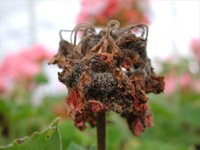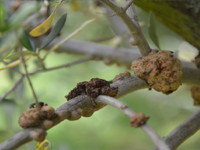Team:Nevada/project/background
From 2013.igem.org
| Line 3: | Line 3: | ||
==Endolysins as a Novel Approach to Pest Control== | ==Endolysins as a Novel Approach to Pest Control== | ||
| - | [[File:Smarterpest.png| | + | [[File:Smarterpest.png|left]] |
Pest control is an issue that is dealt with all over the globe (Irving, 1970). Despite our best efforts to control infections and other parasites that affect our agriculture, nature has found a way to try to outrun our solutions and treatments (Loessner, 2005b). Current treatments for the many kinds of bacterial pathogens that attack crops are imperfect, ineffective, potentially harmful to the environment, and sometimes just non-existent (Okabe and Goto, 1963) (Segner and Scholthof, 2007). There is a need for a new, smarter approach to pest control. | Pest control is an issue that is dealt with all over the globe (Irving, 1970). Despite our best efforts to control infections and other parasites that affect our agriculture, nature has found a way to try to outrun our solutions and treatments (Loessner, 2005b). Current treatments for the many kinds of bacterial pathogens that attack crops are imperfect, ineffective, potentially harmful to the environment, and sometimes just non-existent (Okabe and Goto, 1963) (Segner and Scholthof, 2007). There is a need for a new, smarter approach to pest control. | ||
| Line 9: | Line 9: | ||
Even bacteriophage technology, which has already been approved for use in food preparation and agriculture, can sometimes cause resistance, which is why phage cocktails such as AgriPhage must be continuously tested and updated. There are also still concerns about releasing a mutating, self-replicating virus into the environment to treat plants. | Even bacteriophage technology, which has already been approved for use in food preparation and agriculture, can sometimes cause resistance, which is why phage cocktails such as AgriPhage must be continuously tested and updated. There are also still concerns about releasing a mutating, self-replicating virus into the environment to treat plants. | ||
| + | |||
This year’s Nevada iGEM team proposed the potential of endolysin proteins to be used as a bactericide. Endolysins are proteins that come from bacteriophages and are responsible for host cell lysis. They function with varying mechanisms, but, like bacteriophages, they are each highly specific to their target strain of bacteria and do not harm surrounding flora and fauna. There are also implications that these endolysins do not trigger a resistance response in bacteria(Schmelcher et al., 2012). This makes endolysin therapy an exciting alternative to all current treatment methods. | This year’s Nevada iGEM team proposed the potential of endolysin proteins to be used as a bactericide. Endolysins are proteins that come from bacteriophages and are responsible for host cell lysis. They function with varying mechanisms, but, like bacteriophages, they are each highly specific to their target strain of bacteria and do not harm surrounding flora and fauna. There are also implications that these endolysins do not trigger a resistance response in bacteria(Schmelcher et al., 2012). This makes endolysin therapy an exciting alternative to all current treatment methods. | ||
Revision as of 01:37, 28 September 2013


Endolysins as a Novel Approach to Pest Control
Pest control is an issue that is dealt with all over the globe (Irving, 1970). Despite our best efforts to control infections and other parasites that affect our agriculture, nature has found a way to try to outrun our solutions and treatments (Loessner, 2005b). Current treatments for the many kinds of bacterial pathogens that attack crops are imperfect, ineffective, potentially harmful to the environment, and sometimes just non-existent (Okabe and Goto, 1963) (Segner and Scholthof, 2007). There is a need for a new, smarter approach to pest control.
One example of a current treatment is the use of copper on Erwinia amylovora. This treatment has many disadvantages but is still one of the more commonly used methods to treat this bacterium. In addition to the copper treatment's many environmental harms, research has shown that Erwinia amylovora is finding ways to develop a resistance to the treatments or hide in a state of latency when regulated with copper (Ordax et al., 2006).
Even bacteriophage technology, which has already been approved for use in food preparation and agriculture, can sometimes cause resistance, which is why phage cocktails such as AgriPhage must be continuously tested and updated. There are also still concerns about releasing a mutating, self-replicating virus into the environment to treat plants.
This year’s Nevada iGEM team proposed the potential of endolysin proteins to be used as a bactericide. Endolysins are proteins that come from bacteriophages and are responsible for host cell lysis. They function with varying mechanisms, but, like bacteriophages, they are each highly specific to their target strain of bacteria and do not harm surrounding flora and fauna. There are also implications that these endolysins do not trigger a resistance response in bacteria(Schmelcher et al., 2012). This makes endolysin therapy an exciting alternative to all current treatment methods.
We chose three endolysins to fight three gram negative bacteria that infect common crops.
Three Diseases, Three Endolysins
The first pathogen we chose to focus on was Erwinia amylovora, which is a very harmful gram negative bacterium that causes fire blight in apple and pear trees (Billing, 2011). Despite the fact that Erwinia was the first bacterial plant pathogen to be identified in the late 1790’s, fire blight still remains one of the most devastating diseases to target pome fruits. The bacteriophage ERA103 is known to attack Erwinia amylovora. The bacteriophage endolysin, Lyz103, uses a signal anchor release (SAR) mechanism to degrade the peptidoglycan layer of the bacterial cell wall (Kuty et al., 2010) (Kuty, 2013).The second pathogen we choose to focus on was Xanthomonas Campestris pathovar pelargonii, which causes a serious disease called bacterial blight in geraniums. The bacteria forms water-soaked lesions on leaves and travels through the vascular tissue, causing stem necrosis and death (Strider, 1985). In order to target this disease, we chose a putative endolysin from Xanthomonas bacteriophage Xp15 from UniProt Protein Knowledgebase, which predicted the role of this protein based on genome sequencing.
The last endolysin we choose is called Kz144 which comes from the bacteriophage ϕKz (Briers et al., 2007). This bacteriophage targets pseudomonas aeruginosa, which actually causes human disease(Anzai et al., 1997). We chose this endolysin because it has been shown to be one of the few endolysins with slightly broader specificity. We plan to try it against Pseudomonas syringae, a related bacterial species which can kill young and old fruit trees by causing canker development leading to girdling and destruction of limbs of the tree and ultimately destroying the plant (Kennelly et al., 2007). This particular endolysin has been shown to lyse a few other non-pseudomonas aeruginosa gram negative bacteria when the outer lipid membrane of gram negative bacteria is removed (Briers et al., 2007).
 "
"



